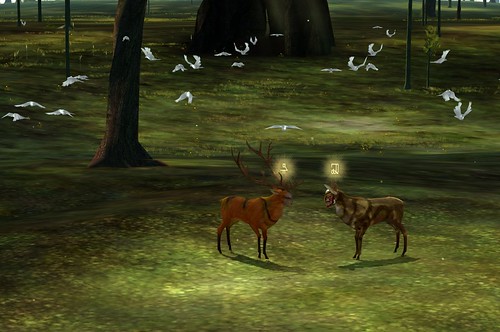Judging by the name of this very blog, you could imagine I would open this post stating that goals are an overrated, unnecessary,
passé elements of game design. Truth is, I've held this vision for quite some time, but I must admit I am re-working that.
There are (roughly speaking) two different ways to describe a goal: (a) an in-game state desired by the
player, made possible by his/hers actions; or (b) an in-game state desired by the
designer, made possible by the player's actions.
Now, it could be hard for a game designer to avoid (a) doing the player's job (by not giving him time to breath or make his own path, regardless of the game's main flow), or, on the other side of the spectrum, assigning his own job to the player (by not giving enough guidance and/or stimulus). The second set of sins are not, as I could have thought before, qualities.
There could be interesting games (can they be called games?) without goals (some are listed around nongames.com,
here), but this is not a reason to say goals are not important. They certainly are central to games, electronic or not. Take a look at
Bateman's entry to understand better why. That other forms of digital entertainment, in spite of video-gamic influences, move away from explicit goal-oriented action, that's a related story. In some cases, I would say goals are still there, only less celebrated as the epicentre of the experience. In fact, I guess that, lately, more and more games follow this approach. Non-games does
not equal non-goals.
"Buddhist" approaches to game design seem to look out for a balance between old-school goal-orientation and fashionable sandbox style. Two other Round Table posts develop this subject:
"You can starve yourself without goals, or you can bloat up and choke on goals. Siddhartha Gautama to the rescue in the form of the middle path. The good news is you can find a hybrid between a total lack of goals and a ridged structure that never changes." (from Inverse)
"Goal-orientation plays on sequential logic, I must do A to get to B to find C to get to D - all the way down the art asset laden alphabet. Freestyling relies on pattern recognition, messing around and finding the form(s) you like. The closer you get to the perfect union of the two, the more these fundamentally different orderings of nuerons (sequential vs. parallel) interact. When that happens, you get subjunctive thought, which is the "what-if" cognition that dreams are made of. Thats where the money is. Thats where the art is. Get deep in the middle." (from King Lud IC)
This balance, I would say, is a safe bet on how large, successful games could (should? would?) be designed from now on. Although I have a feeling that money
and art could on the extremes as well.
By the way, there is an extensive list on the right column of this blog, entitled "TO READ ABOUT PLAY/NONGAMES". If you really are into the subject, you should check some of the links out (not to mention, of course, the other articles of this Round Table session, listed on a drop-down menu by the end of this post).
I could not finish this post without promoting
flora, could I? It's a free-form, creative play style game, after all. You can play the online demo
here. And if you are into the GreatGamesExperiment, why not check
its page over there?
Check out other Round Table posts on the same subject:







